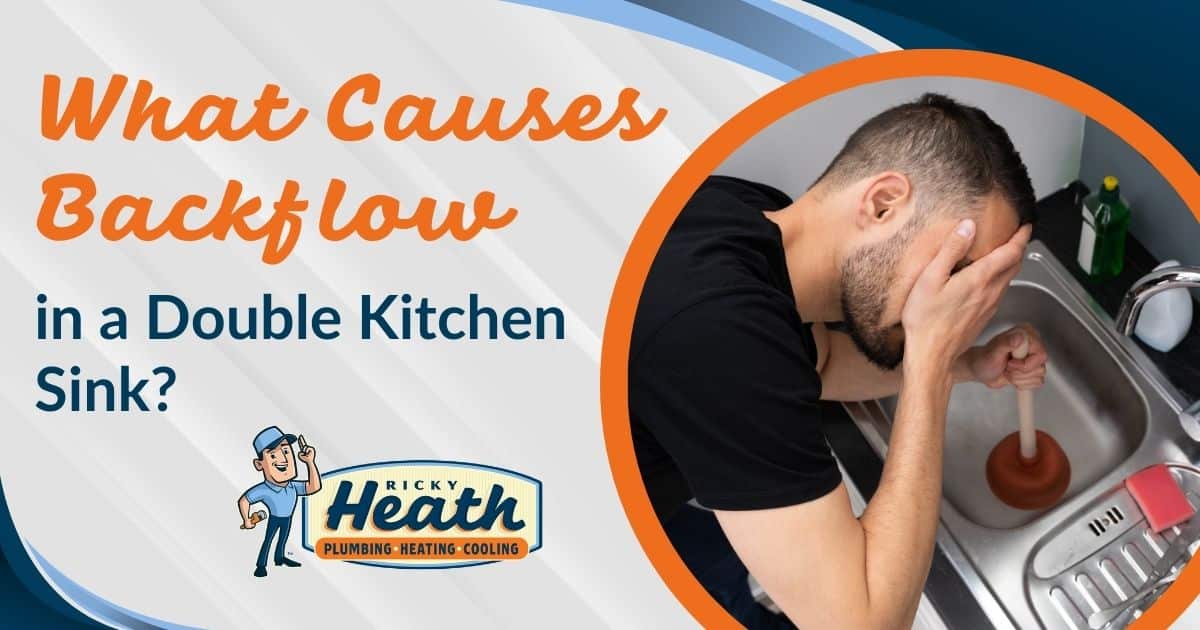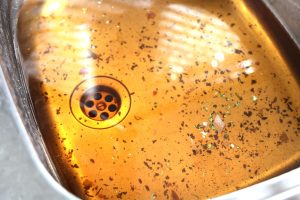
If one of your double sinks is backed up and causing chaos in your kitchen, there’s no need to panic. This common issue is often due to a minor clog or blockage, which you can usually resolve with a few simple steps. Keep reading to discover the most common causes of a kitchen sink backing up on one or both sides, as well as easy fixes you can try to get things moving again.
Primary Causes of Double Kitchen Sink Backflow

Your double kitchen sink is likely backing up due to a clog or blockage. When debris accumulates in the drain, it can create a blockage that causes one side of the sink to back up.
The most common causes of clogs include:
- Food debris: When food or grease builds up in your drain, it can completely block the pipes or stick to the walls, restricting water flow.
- Soap scum: It’s common for soap scum and hard water minerals to accumulate in your pipes over time, causing a backup.
- Foreign objects: Accidentally dropping a foreign object, such as a utensil or container lid, into your drain will prevent water from flowing freely, resulting in a clog.
Keep in mind that your double sinks share the same main drain. If both sides of the sink are clogged, the problem is most likely the main water line drain or your garbage disposal. Plumbing design flaws can also be to blame. If you don’t install your drainage pipes at the proper slope, the clog can worsen due to slow drainage.
Signs of Kitchen Sink Backflow
Before one side of your sink fills with water, it will likely show signs that a clog is occurring. Knowing these early warning signs can help you catch the issue early on and prevent it from worsening. The top indicators you’ll notice include:
- Slow-draining water: Your kitchen sink not draining, or water flowing down slower than usual is often the first sign of a partial blockage.
- Unpleasant odors: When food or stagnant water builds up in your drain, it often produces a foul smell that you’ll notice when you’re near the affected sink.
- Gurgling noises: If you notice gurgling noises coming from your drain, air may be trapped in the pipes due to a clog.
- Fizzy water: When air bubbles try to escape a clogged drain, it can cause a bubbling effect on the water.
- Backups in other sinks: If another sink in your home is experiencing a backup, there may be a blockage in your home plumbing system that requires attention.
How to Fix Backflow in a Double Kitchen Sink
You can often fix minor clogs in a double sink with a few simple household tools. Before calling in the professionals, try these troubleshooting steps:
- Use a plunger: Fill your clogged sink with about three inches of water to help create an airtight seal between the plunger and the clogged pipe. Plug the unclogged side of the sink with a drain plug or rag. Then, push the plunger several times on the clogged side and remove it. If it doesn’t remove the clog, repeat the process. If your dishwasher is causing the backup in your sink, clamp the dishwasher hose first to prevent water from getting into the machine.
- Add baking soda and vinegar: First, remove any standing water from your sink. Then, pour a cup of baking soda down your drain, followed by a cup of vinegar. Wait about 10 minutes. Finally, flush the drain with hot water.
- Try a plumber’s snake or coat hanger: If you think an object is stuck in the drain or pipe, a snake or coat hanger could be the answer. Insert the snake into the drain, push down, and begin to turn the handle. Once you feel the clog break up, pull the snake out and purge the drain with hot water.
When to Call a Professional Plumber
If you’re dealing with a severe or persistent clog and the above steps aren’t working, contact a reputable plumber like the team at Ricky Heath. Plumbing issues can be complex, and attempting to repair the problem on your own can lead to further damage and costly repairs. Professional plumbers have the tools and experience to identify the underlying issue and quickly clear your drain without damaging your plumbing system.
How to Prevent Kitchen Sink Clogs
The best way to prevent kitchen sink clogs is to be proactive. Schedule professional drain cleaning at least once per year to keep your system running smoothly and catch clogs before they progress. With regular maintenance, you’ll notice improved drainage, fewer repairs, and a better plumbing system.
In addition to scheduled tune-ups, there are several steps you can take at home to prevent kitchen sink backflow, including:
- Equip your drains with traps or screens to catch food and other debris.
- Never pour food grease down the drain, where it can congeal and cause a clog.
- Run hot water every time you use your drain to keep it clear.
- Avoid overloading your garbage disposal, and always run water while using it to flush the system.
- Use a natural drain cleaner, like baking soda and vinegar, every few months to prevent buildup in your pipes.
Call Ricky Heath for Drain Clearing in Macon!
If water is quickly backing up into your kitchen sink, don’t waste time searching for a plumber near you. Contact the trained and skilled plumbers at Ricky Heath for immediate repair! Our team has been helping to solve plumbing problems for homeowners and businesses in the Macon, GA, area since 1988. We proudly offer comprehensive sewer and drain services, including drain clearing, preventative cleanings, backflow testing, and more!
Call us or book online to schedule your drain service today!
Frequently Asked Questions
How do I know if my garbage disposal is causing my kitchen sink to back up?
The most common signs that your garbage disposal is the culprit include slow-draining water, water backup on both sides, foul odors, and leaking around the disposal. If you notice any of these warning signs, contact our team for drain inspection and clearing.
Why is my kitchen sink always backed up?
If you’re dealing with persistent backups in your kitchen sink, there may be a more severe issue with your plumbing system. Vent issues, pipe damage, and sewer problems can all cause your kitchen sink to back up repeatedly. Contact our team for a thorough inspection to determine the underlying cause.
What are the most common items that cause plumbing clogs?
The most common items that cause clogs in your pipes include food debris, grease, toilet paper, feminine products, soap scum, hair, and paper towels. Remember to always dispose of these household items properly to prevent backups.